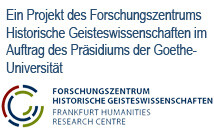Renate von Metzler Room
The newspapers refer to her as a patron of the arts; the citizens of Frankfurt and members of the university know her as a benefactor, and the Hessian Regional Association of the German Multiple Sclerosis Society owes its existence to her commitment. She prefers to see herself as an “initiator” – and one can certainly accuse Renate von Mezler, who was born in 1941, of possessing initiatory tendencies.
When she moved to Frankfurt from the Rhineland in 1968, Renate von Metzler experienced the student protests at first hand. In the bookshop where she began her training as a bookseller – the Bockenheimer Bücherwarte (the later Huss‘sche Universitätsbuchhandlung) – such characters as Joseph “Joschka” Fischer and Daniel Cohn-Bendit, then leaders of the student protest movement and the Frankfurt “Sponti” scene and later prominent politicians and media greats, came and went. Talking with customers from a range of political backgrounds, Renate von Metzler learned at first hand how divided the city was at that time. Overcoming such divisions – building bridges between city and university – has since been a major concern of hers. As the first woman on the board of the “Association of Friends and Sponsors of the Goethe University”, since 2002 she has campaigned for the expansion and integration of the university. Wherever she sees a need for action, the “initiator” gets to work. And many of her projects have been crowned with success. For instance, she initiated, organised, and financed the restoration and hanging of Hans Poelzig’s paintings – the architect who in the late 1920’s created the iconic building complex for IG Farben on what is today the Westend Campus. At the official inauguration of an event series in support of the University initiated by Renate von Metzler, she also won sponsors for a concert grand piano that now stands in the Casino ballroom. She has recently campaigned to enlarge the Bockenheim Campus psychosocial counselling program for students. In recognition of her services, in 2005 the Senate of the Goethe University made her an Honorary Senator, and the University has also named a large room on the first floor of the Casino building after her.
Renate von Metzler’s engagement for the university was preceded by decades of work establishing the Hessian Regional Association of the German Multiple Sclerosis Society, whose chairperson she was until 2015. When she learned how poorly multiple sclerosis patients in Germany were cared for and supported, she decided to take matters into her own hands. She organised outings and meetings for MS patients, made sure they received proper care, collected money, and established grass-root organisations. One local group after another sprang up, and in 1980 the Hessian Regional Association of the German Multiple Sclerosis Society was founded. As Honorary Chairperson of the association, to this day Renate von Metzler collects donations at the annual “Penny Bazaar” in Frankfurt’s Dominican Monastery or during the bicycle tours she organises. She also continues to participate in outings with MS patients. For her campaigning against the effects of this hitherto incurable malady, in 2010 she was awarded the Federal Cross of Merit and in the same year received the Plaque of Honour of the City of Frankfurt. Her efforts have contributed considerably to growing awareness of this affliction and to establishing self-help networks.
If one asks Renate von Metzler for her thoughts on the Westend Campus, besides the ever-impressive architecture of Hans Poelzig she points to the site’s history. She unreservedly welcomes the transformation of the former IG Farben headquarters into a place of education, while being aware of the paradoxes this has involved. She describes such locations as the Wollheim Memorial, the permanent exhibition on the floors of the main building, and the recently renamed streets and squares on the campus as important milestones in an on-going development – one in which the Goethe University embraces its campus’s history. In addition to cultivating historical memory, Renate von Metzler wishes that “the beautiful form of the Westend Campus be reflected in the content of the University’s research and teaching.”
© Frankfurt Humanities Research Centre
Literature and Links:
- Renate von Metzler im Gespräch
- Arning, Matthias: Im Porträt: Die Frau am Leuchtturm. Frankfurter Rundschau, 25.01.2010.
- DMSG: Große Ehre für Renate von Metzler: Ministerin verleiht Bundesverdienstkreuz. Website des Bundesverbands e.V., 03.02.2010.
- FAZ: Frankfurt und Frankfurter. FAZ, 28.04.2004.
- Psychosoziale Beratung des Studentenwerks Frankfurt am Main
- Uni-Report: Die Brückenbauerin. Renate von Metzler ist erste Ehrensenatorin der Universität. Frankfurt am Main, 11.05.2005 (Jg. 38), S. 1






